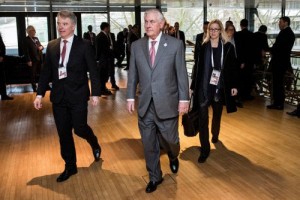Aei.org
Michael Rubin@mrubin1971
AEIdeas
With nearly all cabinet secretaries confirmed and most agency heads as well, President Donald Trump will next set his sights on appointing US ambassadors to lead US missions abroad.
It is an important task and one upon which Trump should focus if he truly wants to keep America great for, indeed, there is much to fix when it comes to the business and culture of diplomacy in order to make US diplomacy more effective.
Trump’s choice of former Exxon Mobil CEO Rex Tillerson to be Secretary of State provides an opportunity for an expert in operations and accountability to reform the management of embassies and the practice of diplomacy. He can approach foreign affairs with a fresh eye and avoid the bureaucratic traps into which those enmeshed in the Foreign Service fall victim.
For too long, secretaries of state have looked at their positions more as an opportunity to enjoy the perks of travel and the title of the office than to fix US diplomacy. Hillary Clinton’s emails, for example, show an obsession more with the numbers of countries visited and miles flown than with the reasons for visiting those countries in the first place. John Kerry’s multi-million dollar jaunt to Antarctica to visit the South Pole should become the symbol of government waste for a generation to come and should land those signing off on the travel in legal trouble for abuse of government resources.
Let’s hope Tillerson is different. The Secretary of State should preside over the strategy of diplomacy and might ceremonially dot the i’s and cross the t’s, but it erodes the power and importance of the office when he or she is constantly on the road; it also undercuts State Department operations. Ambassadors serve as the president’s personal representatives abroad. On a daily basis, they should take the lead.
What Tillerson may find, however, is that State Department policy has for too long restricted and restrained the ability of ambassadors to travel around certain countries even when security is not an issue.
Ambassadors serve as the president’s personal representatives abroad. On a daily basis, they should take the lead.
Consider Morocco: the State Department bans the US ambassador in Rabat from visiting the Western Sahara, a region Morocco has controlled since 1975 and which historically belonged to the kingdom until the Spaniards forcibly seized it in the nineteenth century. Morocco granted the Western Sahara regional autonomy under Moroccan suzerainty, a policy the United States supports. The idea that the US ambassador cannot visit half of Morocco is arbitrary and self-imposed. There is nothing in law that prohibits such visits. Frankly, it is doubtful if anyone on the State Department’s seventh floor even realizes that the US Embassy in Morocco operates under such restraints.
As the former CEO of a multi-billion dollar corporation, Tillerson should understand how important it is to receive true and accurate information. Why shouldn’t the secretary and president have first person views from their personal representative about an issue which dominates bilateral relations? To remove unnecessary travel restrictions for the US ambassador not only in Morocco but also in Algeria and Israel among others would enable US embassies abroad to make US policy more effective and enhance the influence of the United States.
Simply put, it’s a no brainer, and a mistake Tillerson can correct with the stroke of a pen or by hitting “send” on a two-sentence email.








